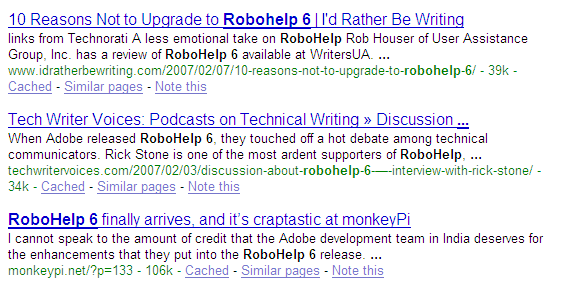How Blogs Dominate Google — One Highly-Linked-To Blog Can Rule the World
"The See-Through CEO," an article by Clive Thompson in the March issue of Wired, provides one of the most compelling arguments for companies to start blogging that I think can be made: Google search rankings. Because Google's search results algorithm is heavily based on links (the more people who link to you, the higher you rise in the search results), getting hip-deep in the blogosphere can make you rise to the first page of Google.
I'm a case in point. Google "Tom Johnson" and you'll see that I'm number eight on the first page of Google's search results. Considering how common my name is, that's pretty remarkable. I'm #8 because 182 blogs are linking to my site (see the Technorati report below):
Now imagine if I had a product that I was actually selling. You can spend thousands of dollars in search engine optimization and Google ads just to get to the first page of Google. Blogging has fortunately provided a much easier (and less costly) way of doing that. Clive Thompson explains:
Think about how Google works. When you type in a term, the search engine puts the site with the most links pointing toward it at the top of the list. That means bloggers and discussion boards are extremely powerful in influencing Google's search results, because bloggers and discussion-board posters are promiscuous linkers, constantly pointing to things they love or hate. Google hoovers up those links and makes recommendations based on them. ... Companies have watched their biggest screwups quickly migrate to the top of a Google search. When Shel Israel and blogger Jeff Jarvis wrote about wretched treatment by Dell's customer service, their posts were so gleefully linked to that for a while they appeared as the number one and two search results for "Dell."6
The last part about Israel and Jarvis posting negatively on Dell and then rising above Dell's own home page link in Google is particularly painful for companies because it means if you don't participate in the blogosphere, Google may penalize you. For example, suppose a reader wants to research RoboHelp 6, deciding whether or not to upgrade. So they google RoboHelp 6. Result 7 on the first page is my post on 10 Reasons Not to Upgrade to RoboHelp 6. Result 8 on the first page is my Tech Writer Voices podcast on RoboHelp. And result 9 on the first page is the infamous and highly influential post on Monkey PI about RoboHelp 6 being "craptastic."
What's interesting is the fact that RoboHelp actually has a blog. But only 14 people link to it.
This leads to a very interesting conclusion: In Google search results, I am more powerful than Robohelp's marketing department (among Google searchers, anyway). Any blogger who has a high Technorati ranking (from lots of links to your blog) has unmatched power in Google. It's like a science fiction movie where you draw more power to yourself as more link to you (so, if you want to make my day, link to me).
Concession: Adobe RoboHelp's product page is the first Google search result, but if you're looking for more than just "where to buy," and are actually researching "whether to buy," you want posts from your RoboHelp Adobe blog to be on the first page.
Let's get back to Clive. Clive says Google is a "reputation-management system." So the only way for RoboHelp's blog to move from page 4 (where it finally appears) to page 1, and to mute my little post, is to get naked. Thompson explains:
... Here's the interesting paradox: The reputation economy creates an incentive to be more open, not less. Since Internet commentary is inescapable, the only way to influence it is to be part of it. Being transparent, opening up, posting interesting material frequently and often is the only way to amass positive links to yourself and thus to directly influence your Googleable reputation. Putting out more evasion or PR puffery won't work, because people will either ignore it and not link to it - or worse, pick the spin apart and enshrine those criticisms high on your Google list of life.
In other words, it's not enough just to start a company blog that's unappealing. No one will link to you, and it will have little effect on Google. But if you get naked in your blog, posting interesting, honest, daring information (any company is rich in this stuff), you'll amass the quantity of links you need to gain influential Google power.
I'm fascinated by the power of the blogosphere. If you assume that the majority of people do research on Google to inform their decisions, joining in the blogosphere in a full-fledged, naked way may be the best thing you can do for your company.
About Tom Johnson

I'm an API technical writer based in the Seattle area. On this blog, I write about topics related to technical writing and communication — such as software documentation, API documentation, AI, information architecture, content strategy, writing processes, plain language, tech comm careers, and more. Check out my API documentation course if you're looking for more info about documenting APIs. Or see my posts on AI and AI course section for more on the latest in AI and tech comm.
If you're a technical writer and want to keep on top of the latest trends in the tech comm, be sure to subscribe to email updates below. You can also learn more about me or contact me. Finally, note that the opinions I express on my blog are my own points of view, not that of my employer.





